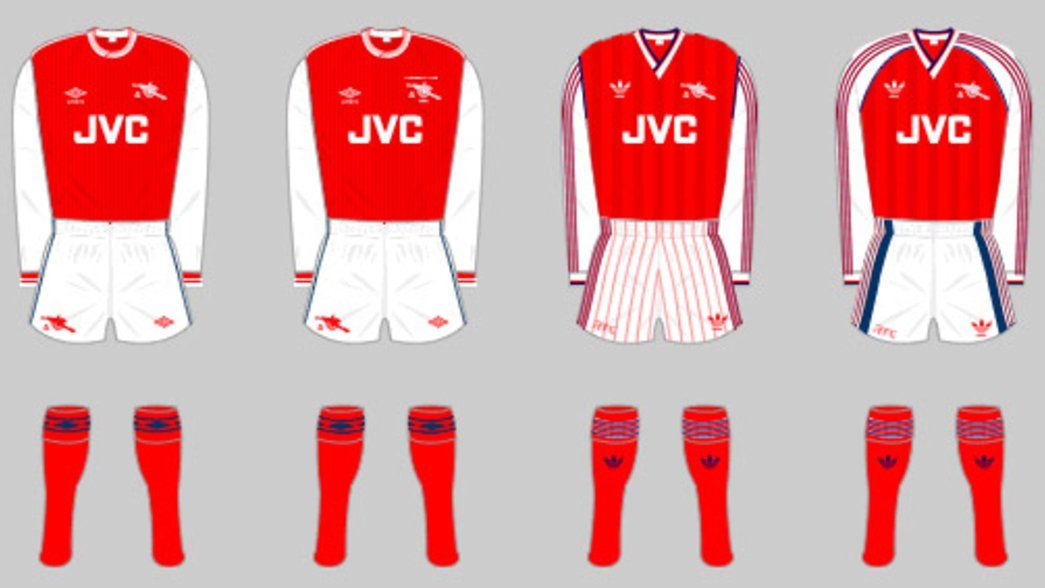The origins of Arsenal's kit tell a great and unusual story.
In 1886, before the Club became professional, a small group of Nottingham Forest players, Fred Beardsley, Bill Parr and Charlie Bates, joined Dial Square FC, (the Club's first name) and brought their old red kit along with them.
Working to a tight budget, the Club decided the most inexpensive way of acquiring a strip was to kit out the team in the same colour as the ex-Forest players. This original kit comprised a dark red shirt with long sleeves, a collar and three buttons down the front. The shirt was worn with white knee length shorts and heavy woollen socks with blue and white hoops. The goalkeeper wore the same attire apart from the shirt, which was a hand knitted cream woollen polo neck jumper.
It was this dark red kit that the team wore during their first season at Highbury in 1913/14. Beardsley, Parr and Bates' generosity in providing shirts and inspiring the Club to play in red encouraged several other teams to follow Arsenal's lead. One of the most famous examples is Sparta Prague whose president, Dr Petric, visited London in 1906. He returned home to Czechoslovakia after having watched Woolwich Arsenal and was so inspired by the kit that he demanded his team play in the same colours. Today, Sparta Prague continue to play in the same dark red kit, not dissimilar to Arsenal's 2005/06 redcurrant.

Arsenal shirts from the 1932, 1927 and 1930 FA Cup Finals
It was the arrival of manager Herbert Chapman, the 'Great Innovator', in 1925 that launched the Arsenal kit as we know it today. Depending on which source you believe, Chapman either noticed someone at the ground wearing a red sleeveless sweater over a white shirt or played golf with famous cartoonist of the day Tom Webster, who wore something similar. Either way, the 'look' inspired the manager to create a new strip combining a red shirt with white collar and sleeves. It also incorporated the Club badge, which was positioned on the left-hand side of the shirt.
In the 1950s a second kit was developed to combat any clash of colours with opposing home teams wearing similar kits. And, in around 1960, the Club moved away from the woven rugby shirt style to a new knitted cotton jersey.
"It was the arrival of manager Herbert Chapman, the 'Great Innovator', in 1925 that launched the Arsenal kit as we know it today. It is said that Chapman noticed someone at the ground wearing a red sleeveless sweater over a white shirt which inspired the manager to create a new strip combining a red shirt with white collar and sleeves."
The Club's famous cannon graphic appeared on the shirt for the first time in 1967. It was with this shirt that Arsenal won their first famous 'double', both the League Championship and the FA Cup in the 1970/71 season. In the late 1970s, the shirt featured a kit manufacturer's logo for the first time, in this case 'Umbro'. And in 1981 'JVC' became the Club's first shirt sponsor, eventually making way for 'Dreamcast' in 2000.
Two years later and 'O2' replaced the games company before 'Fly Emirates' took up the sponsorship in 2006. A deal which will last for eight years. In the 2005/06 season, to commemorate the Club's final campaign at Highbury, the home of Arsenal since 1913, the Gunners wore a special 'redcurrant' shirt. Designed to honour the colour of the Club's set of shirts for the first season at Highbury, they were adorned with gold lettering and accompanied by white shorts and redcurrant socks.
The Arsenal home kit - A history
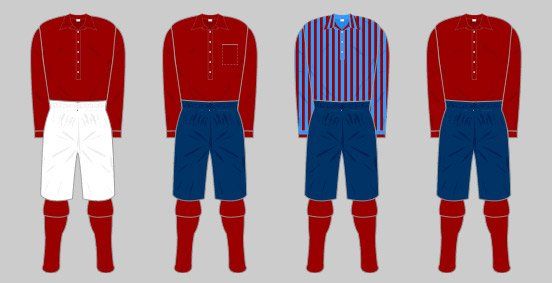
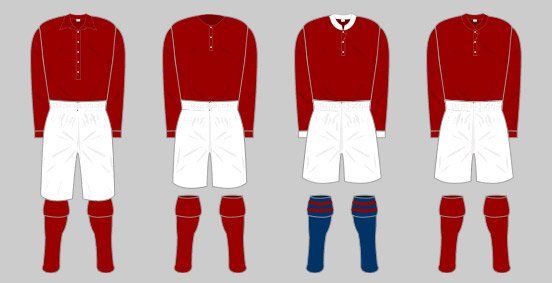
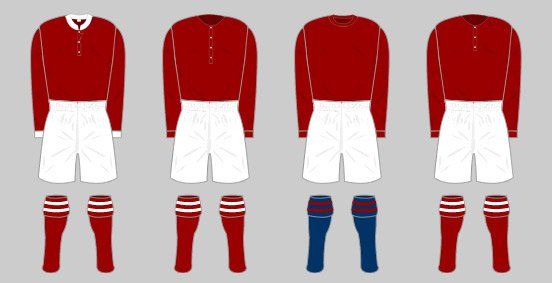
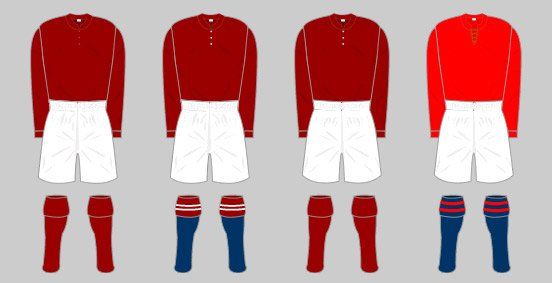
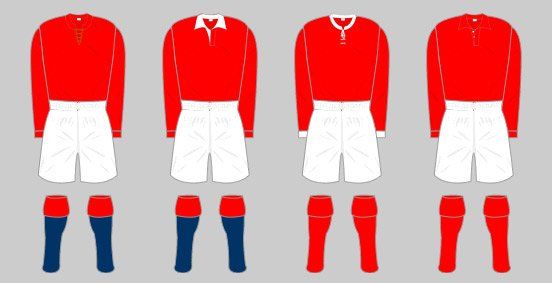
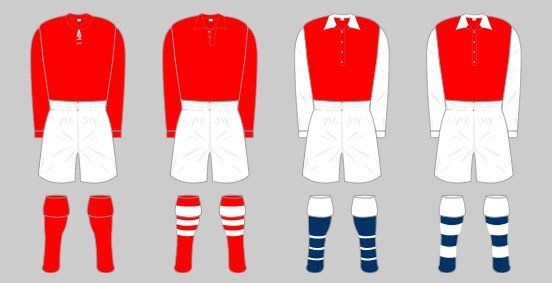
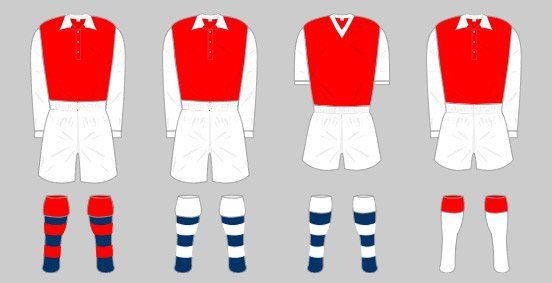
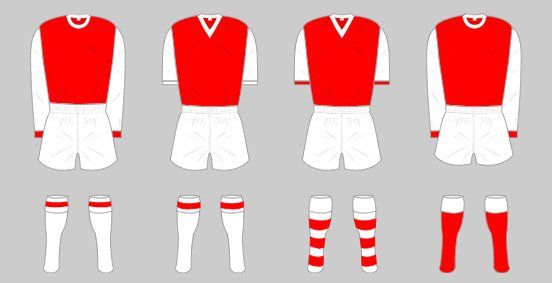
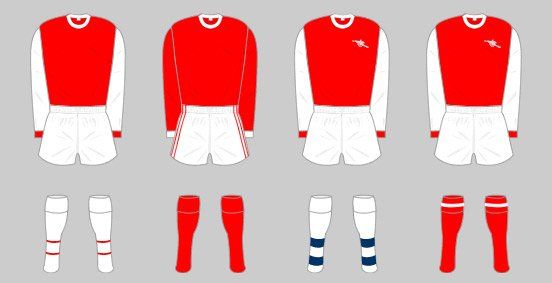
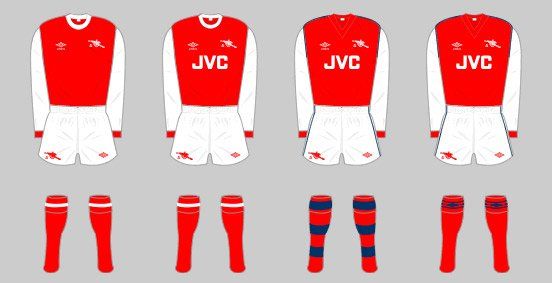
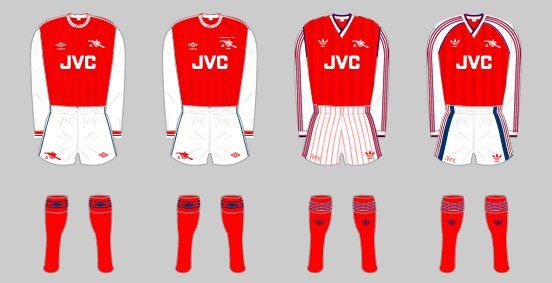
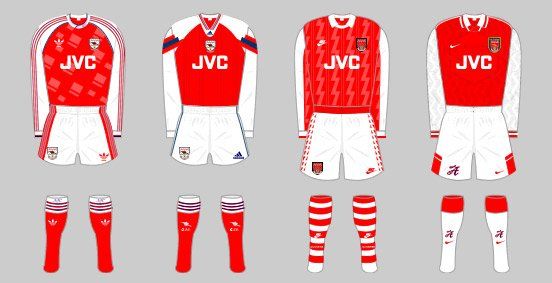
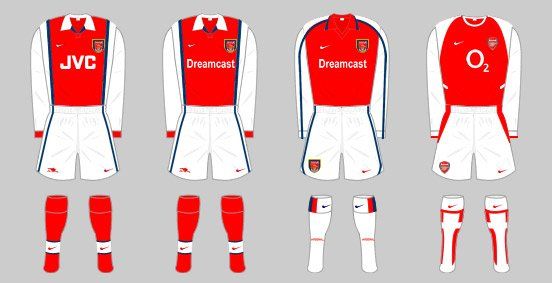
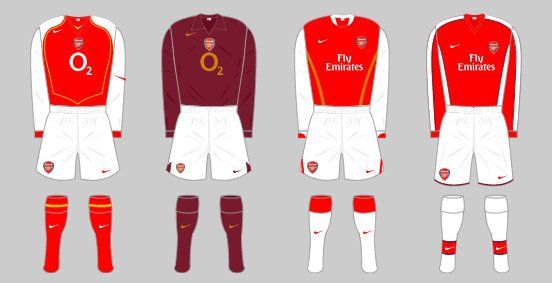
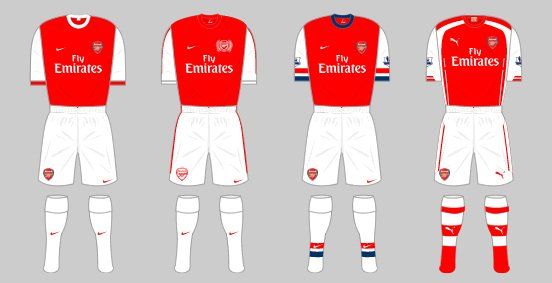
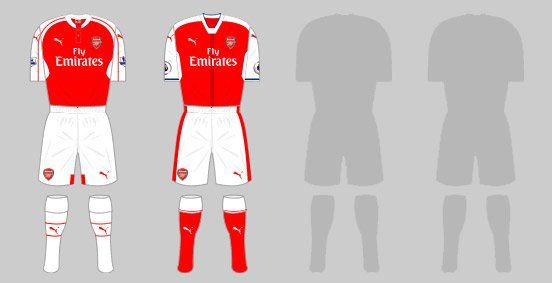
For season 2006/07, the first at Emirates Stadium, a welcome return to the famous red and white was made - although the redcurrant remains to some extent in subsequent strips.
In 2007/08 the Club launched a white-shirted away kit with redcurrant shorts, designed to pay tribute to the influence of Herbert Chapman on the Club, alongside a redcurrant and navy third kit which was believed to be Arsenal's first-ever striped effort. The Chapman-inspired kit sparked reminders that he first introduced white sleeves to the Gunners' shirts, and also pioneered the design of hooped socks - which he believed would help players recognise one another more easily.
To celebrate the 20th anniversary of winning the title at Anfield, the yellow and blue away kit was modelled on that which was worn on that famous night on May 26, 1989. For 2009/10, the away kit features a 'midnight blue' design, including a polo collar inspired by those worn by the all-conquering side of the 1930s. In common with the current home kit, it bears the Club's motto, 'Victoria Concordia Crescit', inside its neck.The 125th anniversary home shirts for the 2011/12 season capture the spirit and history of Arsenal Football Club, the new home shirt features a bespoke crest to highlight the proud origins of the Club 125 years ago.
The Arsenal away kit - A history
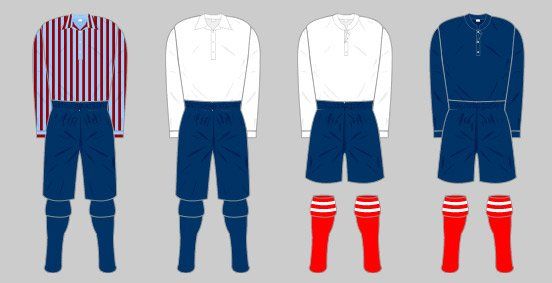
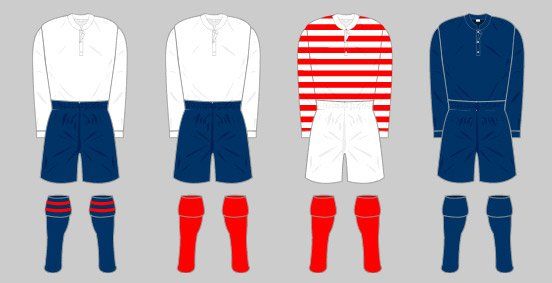
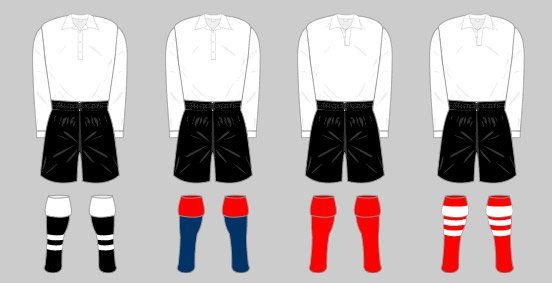
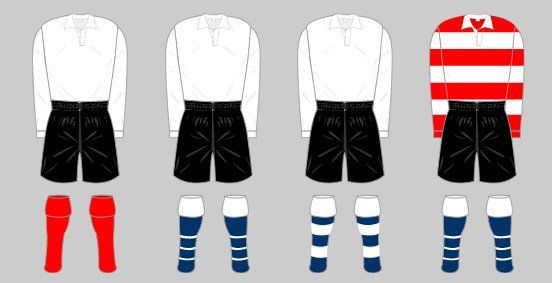
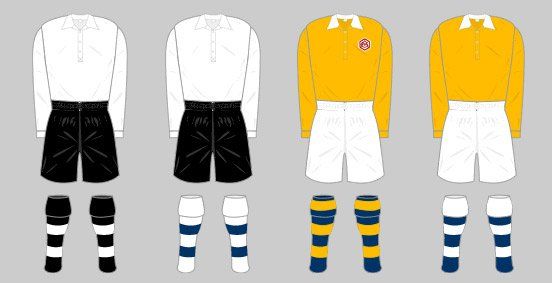
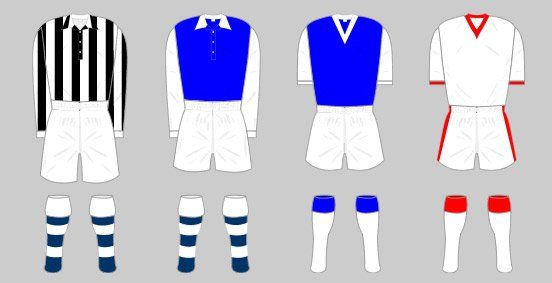
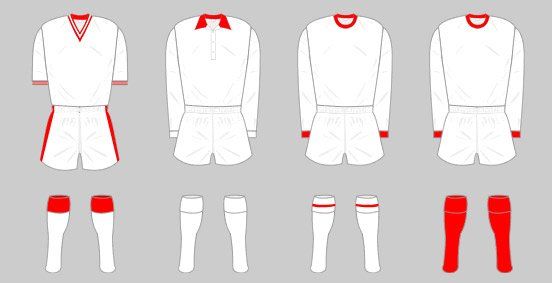
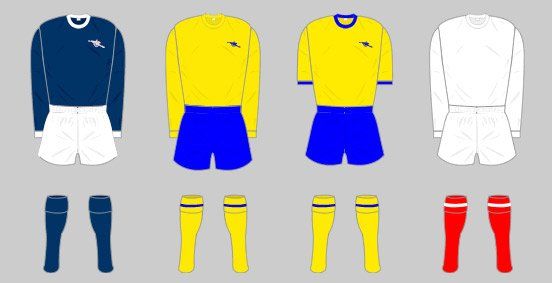
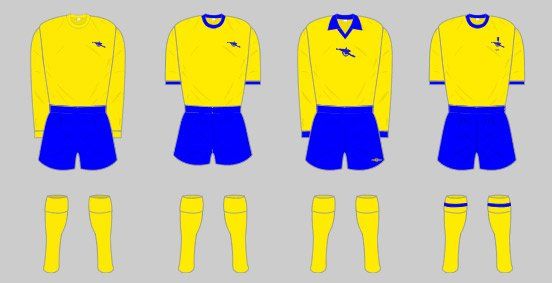
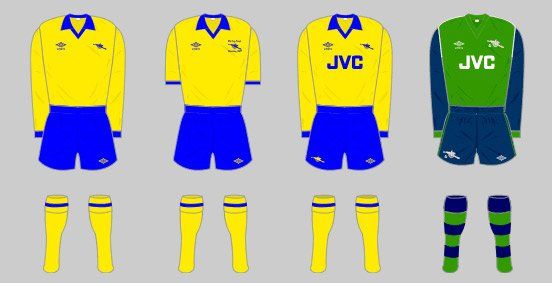
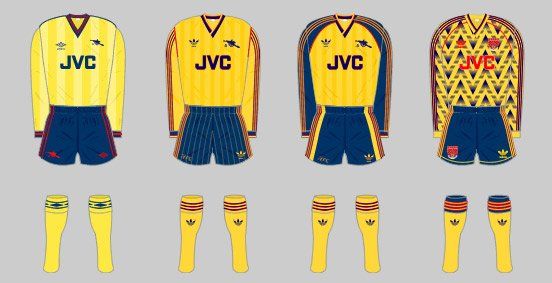
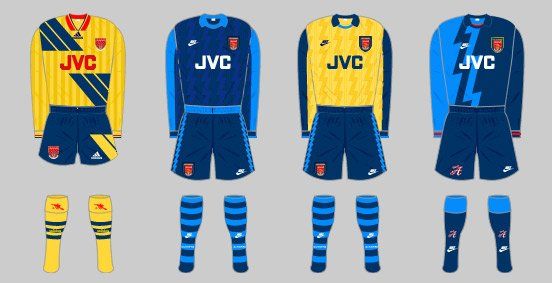
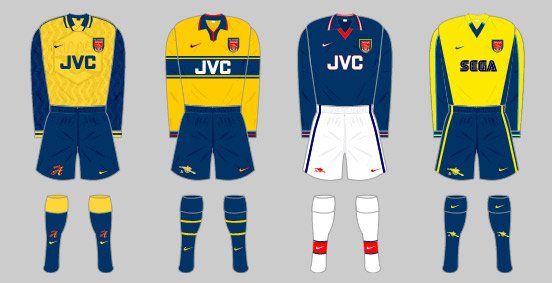
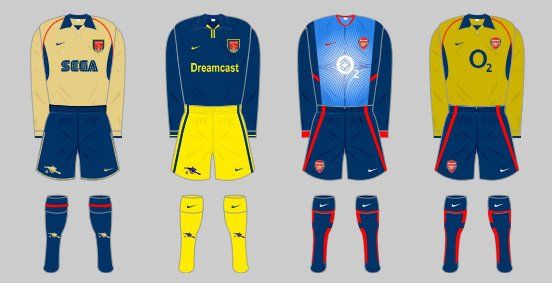
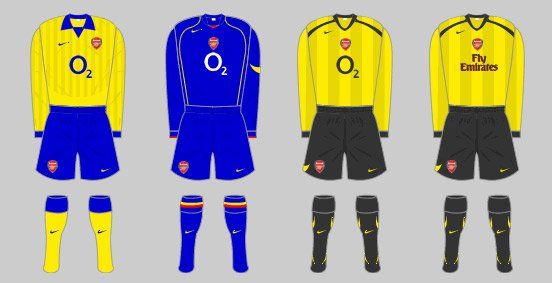
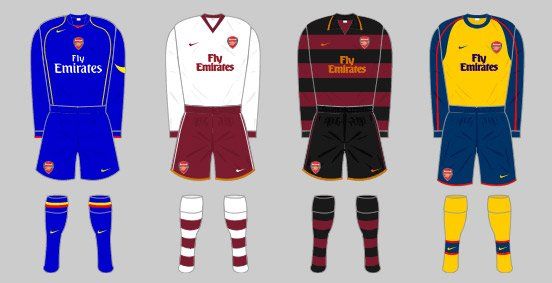
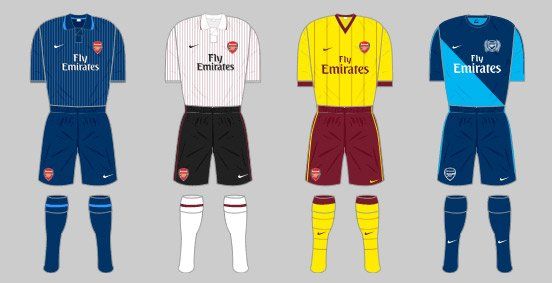
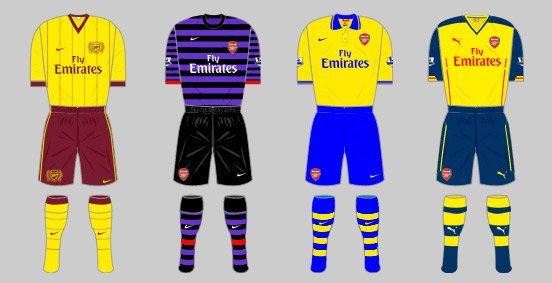
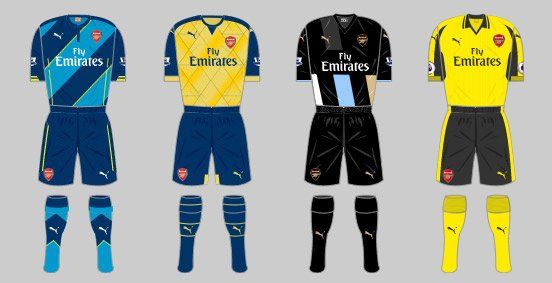
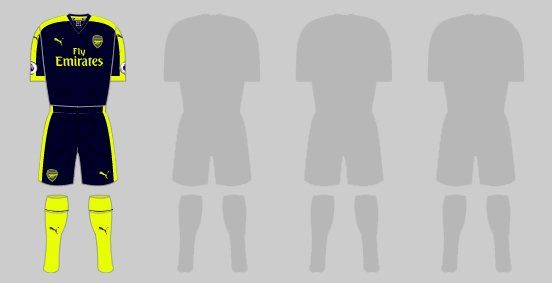
Founded in Woolwich in 1886 and called The Royal Arsenal, the celebratory design features 15 laurel leaves to the left side of the Club's crest to reflect the detail on the reverse of the six pence pieces paid by 15 men to establish the Club - the laurel leaves also represent strength. The 15 oak leaves to the right of the crest acknowledge the founders who would meet in the local Royal Oak pub. Underneath the crest is one of the first recorded mottos related to the armament and battle - 'Forward' - with the anniversary dates of 1886 and 2011 either side of the heart of the shirt.
The classic design is inspired by the 1970's strips and boasts a clean, refined look with a block red body and white sleeves with red speed stripe detail. The shorts are white with a red speed stripe. On the back of the shirt below the neck reads 'Arsenal', while inside the front, on the back of the crest, reads 'Victoria Concordia Crescit', ('Victory Through Harmony'), Arsenal's Latin motto, which was previously featured on earlier versions of their club crest between 1949 and 2002.
Arsenal's home kit for the 2012/2013 season features a blue hoop detail inspired by the home kit socks worn in the 1930s under legendary manager Herbert Chapman.
As is traditional with the north London club, the world renowned red and white is the main colour way in the shirt, with a block red body and white sleeves.
Further details in the shirt include the outer back neck graphic which references the WM formation that Chapman pioneered so successfully, along with the inner back graphic which reads "Victoria, Concordia, Crescit" - the Club's long-held motto since 1948 which translates as Victory through Harmony.
The origins of the blue (obsidian) design features lie in Chapman's innovative approach to the game. Arsenal manager between 1925 and 1934, his guidance took the Club to three league titles and an FA cup victory during that time.
Chapman was a modernising tactician, advocated the use of numbered shirts and white balls, and also made significant changes to the Club's kit for the 1933/34 season. In that year white sleeves were added to the previously all-red shirt and blue hoops were also introduced to the socks. Chapman's rationale for these innovations was he wanted to maximise player visibility, making it easier for his players to pick each other out on the field of play.
The shirt's crest reverts back to Arsenal's primary design, having sported a unique 125th anniversary version for the 2011/12 season. The kit was used for two seasons.
Kit diagrams reproduced by kind permission of historicalfootballkits.co.uk.
Copyright 2024 The Arsenal Football Club Limited. Permission to use quotations from this article is granted subject to appropriate credit being given to www.arsenal.com as the source.




